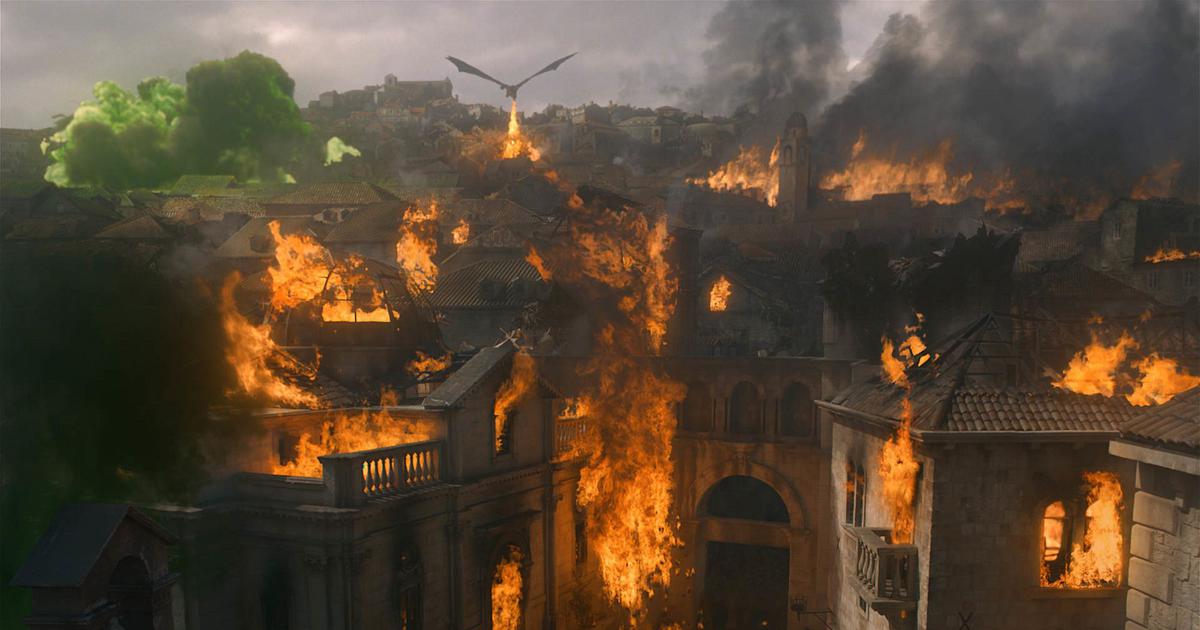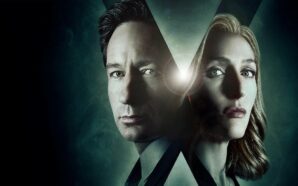Each week I’m revisiting an episode of Game of Thrones’ infamous final season exactly one year after it first aired. Today, I’m looking at the most controversial episode of the entire series: ‘The Bells’.
Game of Thrones is known for its penultimate episodes. The ninth episode of every season – or sixth episode of the seventh season – is the instalment in which some huge moment or conflict takes place, while the finale deals with the fallout and ramifications such dramatic actions. The execution of Ned Stark, the ‘Red Wedding’ and The Battle of the Bastards to name just a few. The fifth episode of the series’ truncated final season is the ultimate penultimate episode of Game of Thrones. The finale will find the characters seeking to build a new, better world out of the ashes of the old one and for that to happen we need to witness the world we’ve inhabited for eight seasons, and many of its characters, be incinerated.
 To say that ‘The Bells’ is a controversial episode of television is a huge understatement. I’ve never seen a single episode of any show create such passionate ire, as characters finally collide and stories are wrapped up heading into the much quieter series finale. The fan reaction is matched only by the scope of the episode, which may be one of the biggest, most destructive and most beautiful episodes of television in the storytelling medium’s long history. But, as Daenerys sets her sights on King’s Landing, her heart filled with Targaryen fire, is it just the city that will burn or all good will towards the once great series too?
To say that ‘The Bells’ is a controversial episode of television is a huge understatement. I’ve never seen a single episode of any show create such passionate ire, as characters finally collide and stories are wrapped up heading into the much quieter series finale. The fan reaction is matched only by the scope of the episode, which may be one of the biggest, most destructive and most beautiful episodes of television in the storytelling medium’s long history. But, as Daenerys sets her sights on King’s Landing, her heart filled with Targaryen fire, is it just the city that will burn or all good will towards the once great series too?
While the episode will become one of the most spectacular to ever grace the screen, ‘The Bells’ begins with a surprisingly quiet and slow sequence. Dark too. For all the complaints ‘The Long Night’ received about being visually too dark, the first few minutes of ‘The Bells’ are far darker, even on 4K Blu-ray. Varys is found guilty of treason by Daenerys, with the eunuch having sent messages to the lords of Westeros asking them to switch their allegiance to Jon. After a brief moment with Tyrion and a final plea for Jon to take the throne, Varys is burnt to death by Drogon, an action that foreshadows Daenerys’ plans for King’s Landing.
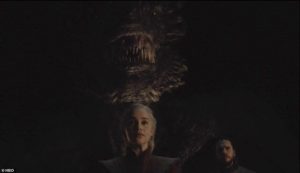 Varys was once a key character in the show, and his actions often had greater impacts than the kings and queens we’ve seen over the series, but he had been left with so little to do these past two seasons. Like Littlefinger last season, the main characters have outgrown these side characters and broken free of their machinations. It’s time for grand deeds, not backstabbing deals. Even Tyrion has had little to do for seasons now, biding his time for his substantial role in the finale. Davos has all but disappeared too and only appears when his expertise is needed to smuggle someone into King’s Landing off camera or serve soup to some soldiers. These characters have reached the end of their stories and, if they don’t die, are just waiting for the main characters to catch up and the show to end.
Varys was once a key character in the show, and his actions often had greater impacts than the kings and queens we’ve seen over the series, but he had been left with so little to do these past two seasons. Like Littlefinger last season, the main characters have outgrown these side characters and broken free of their machinations. It’s time for grand deeds, not backstabbing deals. Even Tyrion has had little to do for seasons now, biding his time for his substantial role in the finale. Davos has all but disappeared too and only appears when his expertise is needed to smuggle someone into King’s Landing off camera or serve soup to some soldiers. These characters have reached the end of their stories and, if they don’t die, are just waiting for the main characters to catch up and the show to end.
Varys’ death leaves a longstanding mystery unanswered, but it’s one I believe is correct to leave open ended. When he was a child Varys was castrated and his genitals were thrown into a fire by a sorcerer. From the flames he heard a voice that uttered something that shook him to his core and led him down the path that ended when Dany executed him at Dragonstone, but we never learnt what that voice – probably the Lord of Light – said to him. Which is fine by me. I know many were disappointed at the lack of resolution surrounding the gods and their role, if any, in the titular game. But I believe that the entire point of such things, whether wholly made up religions or ambiguous supernatural conniving, is for them to be interpreted and misinterpreted, like here in the real world, without a definitive answer. If we were to discover what the voice said, who the voice belonged to or its purpose, then the answer would likely be unsatisfying and it should remain ambiguous, with the audience, like the characters, choosing what interpretation to follow or how much faith to put in such things.
 Meanwhile, Jaime arrives at the encampment surrounding King’s Landing with the wish of reuniting with his sister on the other side of the gates. As I explained in detail in my review of ‘The Last of the Starks’, I really hate this storyline and Jaime’s character turn. While it makes sense to me that Daenerys will go on to embrace her Targaryen nature, it just doesn’t for Jaime to rewrite seven and a half seasons of development and re-embrace being a Lannister. After so much growth, him saying that he doesn’t care for the innocents in the city, even though 20 years ago he spared those citizens from a similar fate at the hands of Dany’s father, and only cares about Cersei angers me. It just doesn’t make sense. The Lannister brothers get a touching scene together, which works from Tyrion’s point of view but not Jaime’s, and the younger brother says that Jaime was the only one who didn’t treat him like a monster before freeing him from captivity, all but assuring his execution. Although the moment is tainted by the bizarre inclusion of a generic and out-of-place joke in the scene beforehand in which Tyrion tries to speak to some Unsullied in their language before discovering they could speak ‘the common tongue’ all along. How hilarious.
Meanwhile, Jaime arrives at the encampment surrounding King’s Landing with the wish of reuniting with his sister on the other side of the gates. As I explained in detail in my review of ‘The Last of the Starks’, I really hate this storyline and Jaime’s character turn. While it makes sense to me that Daenerys will go on to embrace her Targaryen nature, it just doesn’t for Jaime to rewrite seven and a half seasons of development and re-embrace being a Lannister. After so much growth, him saying that he doesn’t care for the innocents in the city, even though 20 years ago he spared those citizens from a similar fate at the hands of Dany’s father, and only cares about Cersei angers me. It just doesn’t make sense. The Lannister brothers get a touching scene together, which works from Tyrion’s point of view but not Jaime’s, and the younger brother says that Jaime was the only one who didn’t treat him like a monster before freeing him from captivity, all but assuring his execution. Although the moment is tainted by the bizarre inclusion of a generic and out-of-place joke in the scene beforehand in which Tyrion tries to speak to some Unsullied in their language before discovering they could speak ‘the common tongue’ all along. How hilarious.
After twenty minutes of preamble and last-minute character maneuverings, the ‘Last War’ is set to begin, and end. Jon and the Northern forces arrive at the city gates as Cersei’s men line the city wall, the Golden Company prepare for the Dothraki charge and Euron’s fleet fills the harbour, scorpions loaded, all of them waiting for the spark that will begin the fateful battle. But rather than a spark, they get a whole conflagration. There are few things I love more than a pre-battle montage. Soldiers gathering weapons and finding their place; arrows nocked and bow strings pulled taut; the eerie silence before all hell breaks loose. Director Miguel Sapochnik gives us a great one here but credit has to also go to Ramin Djawadi whose music always elevates the material, never more so than in the final season. The tension is soon broken by Daenerys, riding Drogon straight into the Iron Fleet, burning the ships like kindling before heading for the main gate and allowing her armies access into the city. At first, she attacks tactically but, as the bells ring for surrender, she turns her dragon and fury on the city without mercy in a legendary Targaryen rage.
 After a quick rush last episode to get her to this vengeful headspace, Dany decides that if she can’t have love then fear will have to do. Unlike Jaime’s turn over the last couple of episodes, I think this decision to have her resort to villainy – to put it far too simply – makes sense and I like it. The final steps on this long journey to get her here could have been executed much better but this is my preferred destination for the character, as she finally completes the Mad King’s legacy and burns them all, even lighting her father’s remaining wildfire caches throughout the city. The moment when the bells are ringing and Daenerys looks around before securing her gaze on the Red Keep and her prize is chilling, but it does feel a little odd when she first starts annihilating innocent citizens. I like the end result of her rage and the apocalypse she brings down on the innocuous denizens of King’s Landing but the moment itself is slightly clunky. We see her head towards the Red Keep and Cersei, ignoring the surrender, and then the next time we see her she’s no longer heading for the Keep and is making strafing runs in the opposite direction.
After a quick rush last episode to get her to this vengeful headspace, Dany decides that if she can’t have love then fear will have to do. Unlike Jaime’s turn over the last couple of episodes, I think this decision to have her resort to villainy – to put it far too simply – makes sense and I like it. The final steps on this long journey to get her here could have been executed much better but this is my preferred destination for the character, as she finally completes the Mad King’s legacy and burns them all, even lighting her father’s remaining wildfire caches throughout the city. The moment when the bells are ringing and Daenerys looks around before securing her gaze on the Red Keep and her prize is chilling, but it does feel a little odd when she first starts annihilating innocent citizens. I like the end result of her rage and the apocalypse she brings down on the innocuous denizens of King’s Landing but the moment itself is slightly clunky. We see her head towards the Red Keep and Cersei, ignoring the surrender, and then the next time we see her she’s no longer heading for the Keep and is making strafing runs in the opposite direction.
It is undeniably awesome to finally see the sheer destructive power of a dragon unleashed after seasons of teases, as well as that prophesied shot of Drogon’s shadow on the rooftops of King’s Landing come true. Although, it is a little convenient that Dany could do nothing but run from Euron’s fleet last episode but now destroys it entirely in ‘The Bells’, before heading off to raze the city to the ground. I think we should have seen a couple of scorpion bolts almost hit Drogon, creating some tension and making the violent endeavour slightly harder for Daenerys. As it stands, there’s no drama in the battle and it feels like a massacre from the beginning, which I don’t think it should until after the bells ring. There’re also suddenly hundreds of Dothraki in the battle despite most of them seemingly being wiped out in ‘The Long Night’. The size of the armies in the show never feel consistent.
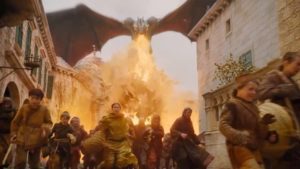 And so beings the butchery of King’s Landing. On rewatch, I was shocked at just how disturbing and bloody the violence is, not just Dany’s attacks from on high but the Unsullied’s merciless slaughter of innocents too. The scale of the destruction and chaos is phenomenal and visually amazing. Both the CGI effects and the in-camera effects, including real sets and stunt work, are at the highest level imaginable, whether it be feature film or television. It’s a truly spectacular hour of TV. Sapochnik does enjoy his one long shot action sequences with no cuts (or at least hidden cuts) but this is a technique I’m personally growing increasingly tired of. It’s supposed to be immersive but too often it just feels like showing off. Despite the long running time, the episode is never boring and the extreme violence and destruction never feels pornographic. It’s necessary to see the repercussions of Dany’s actions in full gory detail. The entire sequence feels more apocalyptic than the actual near-apocalypse that happened just two episodes earlier.
And so beings the butchery of King’s Landing. On rewatch, I was shocked at just how disturbing and bloody the violence is, not just Dany’s attacks from on high but the Unsullied’s merciless slaughter of innocents too. The scale of the destruction and chaos is phenomenal and visually amazing. Both the CGI effects and the in-camera effects, including real sets and stunt work, are at the highest level imaginable, whether it be feature film or television. It’s a truly spectacular hour of TV. Sapochnik does enjoy his one long shot action sequences with no cuts (or at least hidden cuts) but this is a technique I’m personally growing increasingly tired of. It’s supposed to be immersive but too often it just feels like showing off. Despite the long running time, the episode is never boring and the extreme violence and destruction never feels pornographic. It’s necessary to see the repercussions of Dany’s actions in full gory detail. The entire sequence feels more apocalyptic than the actual near-apocalypse that happened just two episodes earlier.
Within the chaos erupting across the city, we cut to the Hound and Arya making their way to and through the Red Keep on their way to kill The Mountain and Cersei respectively. I wish we got to see the two characters journey south together instead of just leaving Winterfell in the previous episode and appearing at King’s Landing at the start of this one, but that’s what you get with just six episodes to tell the story. Just before they encounter their targets, Sandor pulls Arya aside and tells her to go home and abandon this quest for vengeance. The moment is rushed but I like the idea of it and its outcome. Within an inferno of Daenerys’ corrupting revenge, Arya looks at the Hound and realises she doesn’t want to be like him – a slave to revenge, literally scarred by it. After seasons of becoming an adult in this harsh world, Arya almost becomes a child again as she listens, her face cupped by the Hound’s giant hands. She agrees to go and while she walked into the city like a Terminator she runs out like a scared girl, her innocence and freedom saved after a quest of misery.
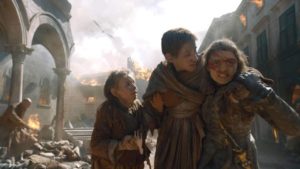 I really do love everything with Arya in this final season and I think it’s a surprising yet genius move to have Arya be the one on the ground, our point-of-view character in Hell, seeing the human cost of Dany’s unforgivable actions. Over the course of the series, Arya has become almost inhuman, an unfeeling killing machine, but here, under extraordinary circumstances, she not only regains her humanity but represents humanity at large. The unfeeling character is now Daenerys who we don’t actually see again after her decision to burn the city down. After that we only see Drogon and the destruction she’s reigning down. Dany is gone and nothing but a force of nature remains, hellbent on burning down her opponents in the game for the Iron Throne.
I really do love everything with Arya in this final season and I think it’s a surprising yet genius move to have Arya be the one on the ground, our point-of-view character in Hell, seeing the human cost of Dany’s unforgivable actions. Over the course of the series, Arya has become almost inhuman, an unfeeling killing machine, but here, under extraordinary circumstances, she not only regains her humanity but represents humanity at large. The unfeeling character is now Daenerys who we don’t actually see again after her decision to burn the city down. After that we only see Drogon and the destruction she’s reigning down. Dany is gone and nothing but a force of nature remains, hellbent on burning down her opponents in the game for the Iron Throne.
While Arya runs for her life, the Hound accepts his death as he faces his seemingly immortal undead brother for the much anticipated ‘CleganeBowl’. Sandor easily dispatches four (!) members of the Kingsguard while his mere presence is enough to break Gregor from his programming and Frankenstein quickly, but satisfyingly, kills his creator. The fight between them is good and they do a great job at making the Mountain almost unstoppable. On a stunning backdrop of destruction, we get a brief return of Gregor’s ‘greatest hits’ as he swings his ginormous sword and sticks his thumbs in his brother’s eyes, just like he did with Oberyn in season four – the show’s best season. It’s amazing to see Sandor laugh in the face of adversity for once after years of seeing him cower away from his fears, mainly his brother and fire, and so it’s a perfect ending to have him grab his brother and tumble down into the dragon fire below. A fitting final fight in a conflict hyped much more by fans of the show than the series itself had been fueling.
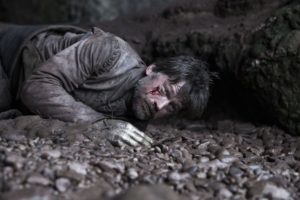 While the brothers face off, another fight is happening not too far away. In a far too coincidental meeting, Jaime reaches the base of the Red Keep on his search for Cersei (who has done nothing in the episode except look out of a window) while Euron reaches the shore after surviving Drogon’s flames. The fight itself is fine, I guess. Lots of falling over, reaching for swords, non-fatal stabbings, rinse and repeat until Jaime skewers Euron and leaves him for dead. Euron dies believing that he killed Jaime, even though the Kingslayer walks away from the fight. Euron has always been cocky so it’s right he dies believing some arrogant self-delusion. The problem with the fight is that as much as it might make sense for these two to fight over Cersei, I just don’t care. I have no investment in the battle. Jaime has gone from one of my favourite characters to one of my least favourite characters over just two episodes and Euron has never been more than a sneering baddie, making a poor comparison to some of the series’ greatest villains.
While the brothers face off, another fight is happening not too far away. In a far too coincidental meeting, Jaime reaches the base of the Red Keep on his search for Cersei (who has done nothing in the episode except look out of a window) while Euron reaches the shore after surviving Drogon’s flames. The fight itself is fine, I guess. Lots of falling over, reaching for swords, non-fatal stabbings, rinse and repeat until Jaime skewers Euron and leaves him for dead. Euron dies believing that he killed Jaime, even though the Kingslayer walks away from the fight. Euron has always been cocky so it’s right he dies believing some arrogant self-delusion. The problem with the fight is that as much as it might make sense for these two to fight over Cersei, I just don’t care. I have no investment in the battle. Jaime has gone from one of my favourite characters to one of my least favourite characters over just two episodes and Euron has never been more than a sneering baddie, making a poor comparison to some of the series’ greatest villains.
Jaime reaches Cersei just in time, dodging the crumbling architecture as he makes his way to the map room. They embrace atop the map of the Seven Kingdoms Cersei had painted last season as it crumbs and turns to dust. The power she once had is destroyed and replaced by all that really mattered: her brother/lover. How romantic. They travel to the crypts to find a secret way out only to find it collapsed and the siblings are trapped as the ceiling caves in. They die together, embracing, just as they were born. While I dislike this full circle narrative choice for Jaime, I think this is the perfect death for Cersei. All that she has gained falls on top of her and she dies cowering in a basement, terrified. It brings to mind thoughts of Hitler who died scared in some hidden away bunker. She gets what she deserves and thankfully not some grand death. I only wish that she was alone and Jaime was back in Winterfell, or had died protecting the Stark homestead.
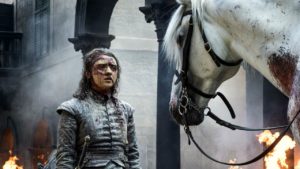 The episode ends with Arya waking up in the ash, surrounded by nothing but bodies, among them the mother and daughter she tried to save in her tense journey through the hellscape caused by Daenerys. She rises bloodied and battered, finds a pale horse and rides out of hell into peace as ash falls gently around her. This symbolic ending could easily have been the last time we see Arya, and when I first watched the episode I thought maybe it would be, but she’ll be back in the finale. Game of Thrones’ biggest episode concludes with a moment of calm in which we can all finally catch our breath and try and comprehend what we’ve just witnessed, whether it be a televisual masterpiece or a huge betrayal.
The episode ends with Arya waking up in the ash, surrounded by nothing but bodies, among them the mother and daughter she tried to save in her tense journey through the hellscape caused by Daenerys. She rises bloodied and battered, finds a pale horse and rides out of hell into peace as ash falls gently around her. This symbolic ending could easily have been the last time we see Arya, and when I first watched the episode I thought maybe it would be, but she’ll be back in the finale. Game of Thrones’ biggest episode concludes with a moment of calm in which we can all finally catch our breath and try and comprehend what we’ve just witnessed, whether it be a televisual masterpiece or a huge betrayal.
So, which is it? Unsurprisingly, neither. It’s an episode that leaves me largely satisfied and it’s exciting to watch just on a sheer cinematic level. Storytelling-wise I think it’s quite good and the instalment offers just as much of an ending as next week’s finale. The controversy of the episode surrounds Daenerys and her actions, and while I can understand some of the fervour it caused for many, personally I think this is where Dany’s story needed to go. It’s the payoff to a subtle set up eight seasons in the making and it is only slightly squandered by the poor execution of the final steps to get her to this point. As I’ve said before, ‘The Last of the Starks’ is the worst episode of the series but ‘The Bells’ is much more successful. The heights of Arya and the visual craftsmanship even out the negativity I feel towards Jaime’s ending, and ultimately I enjoy the episode quite a lot, despite some notable flaws. But I can’t help feeling I should like it more than I do. If you described this episode to me a few seasons into the show then I would think that it sounded like the greatest thing ever but now, after a couple of weaker seasons, I struggle to get too excited for it. I enjoy the episode, but there is a tinge of disappointment.
I’m almost too scared to ask but what do you think of Game of Thrones’ most controversial episode? Let me know in the comments and be sure to geek out with me about TV, movies and video-games on Twitter @kylebrrtt. Join me next week when, exactly one year after its first airing, I revisit the final episode of the entire series, ‘The Iron Throne’.




